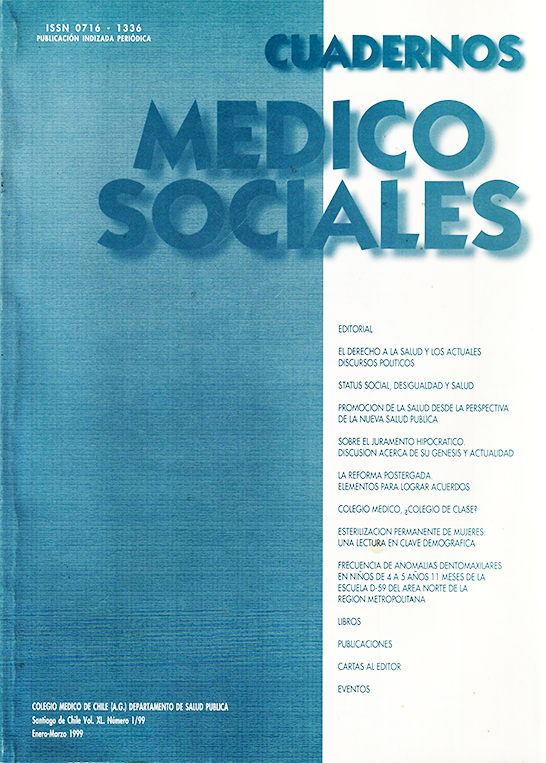La reforma postergada. Elementos para lograr acuerdos
Keywords:
Reforma de Salud, ChileAbstract
In Chile and Latin America we have seen a growing awareness of the need to closely discuss health sector reforms from a viewpoint closer to civil society and more independent of the institutions that have been promoting, initiating and, generally, financing the processes in health change. While this helps to broaden the debate and involve the key players, the crisis in the sector still persists as more than a phenomenon of “poor adjustment” to the socioeconomic and cultural environment. The health sector should not address these changes with the idea of merely doing thins differently, but should approach the solution by reorienting its objectives through coupling health problems with some expression of current societal order. Some socio-political factors are useful in clarifying why it has been impossible to agree on a health policy, a policy essential in adopting methods to resolve the health problems in this country. These factors include: a lack of an established health vision and an insufficiently defined mission; a need to agree on a definition of strategic concept; mistrust between actors; a risk of assimilating health management to profitable companies; a “health culture” that should play a part in the changes and, finally, diverse health agents have an unavoidable responsibility in this process of change. A second area of great importance is the structural, organizational and functional conditions of health services that must be met in order to respond to the health needs of all Chileans. For the proper provision of these services it will be crucial to strengthen the public health subsystem, to ensure universal coverage of guaranteed services, adjust service provision to new demand, consider separating the roles of the interior at the health system and, develop a new health care model. Up to now reform experiences have showed that in a determined context it is necessary to rearrange health objectives and confront critical themes to guarantee the success of the process of change. Four such themes deserve close consideration: a) the social health guarantee; b) the role of the state; c) management models and the efficiency of reforms; and d) the role of social actors in health reforms. Only through the acceptance of the above mentioned socio-political factors, structural, organizational and functional conditions, will it be possible to apply the following strategic recommendations to achieve a successful health reform. First is the establishment of a shared diagnosis and vision considering the role of the State, government, professionals and social organizations, as well as the resources available. Second is the creation of an objective mid-term plan. The third is to realize that more than what needs to be done is to define how to do it. The fourth is to achieve the success of public policies through the cohesion of the government, meticulous technique, credibility and, attractiveness to the different actors and the citizenry involved. The fifth is the necessity of defining the future agenda.
Downloads
Downloads
Published
How to Cite
Issue
Section
License

This work is licensed under a Creative Commons Attribution-NonCommercial-ShareAlike 4.0 International License.


